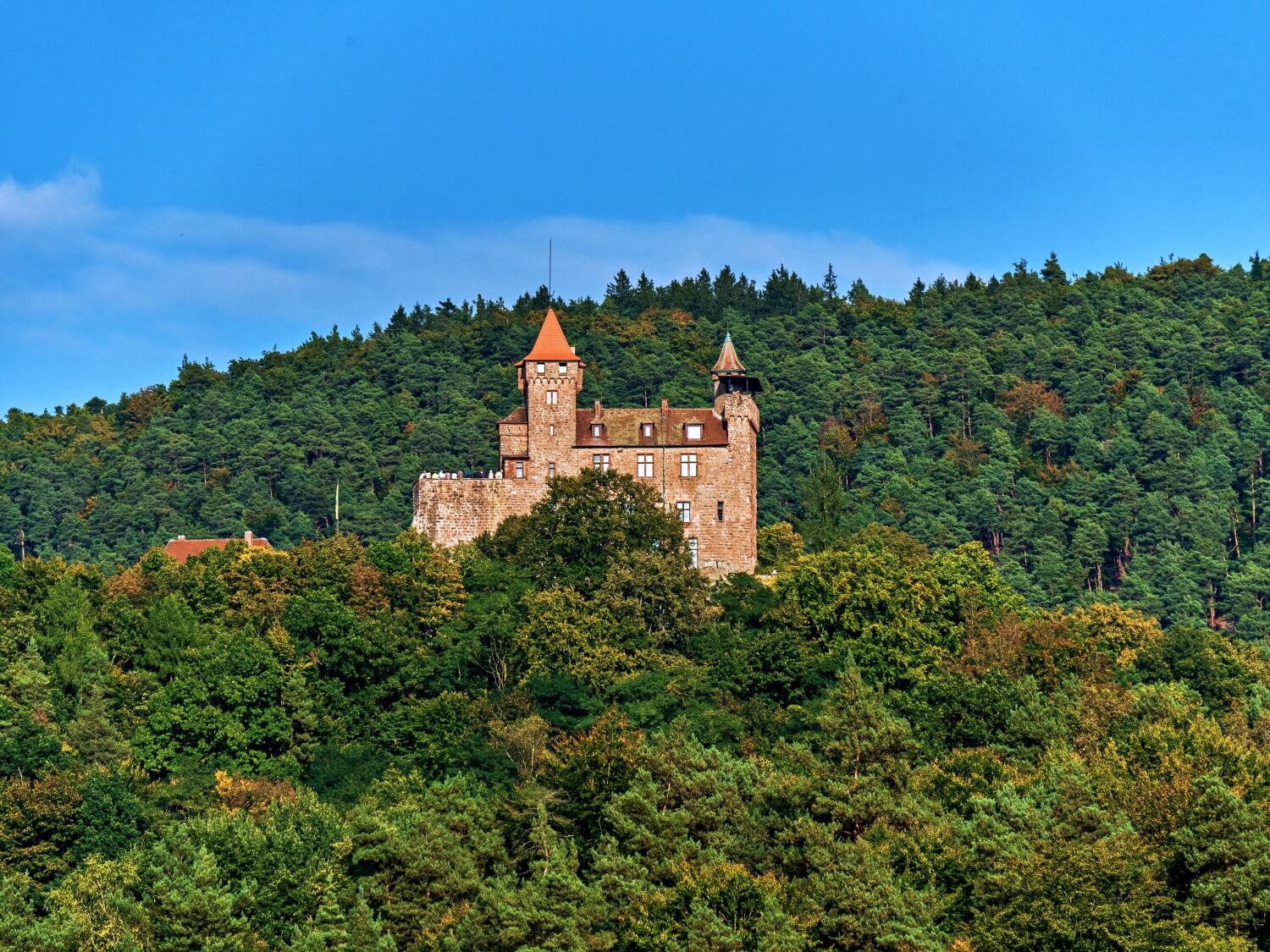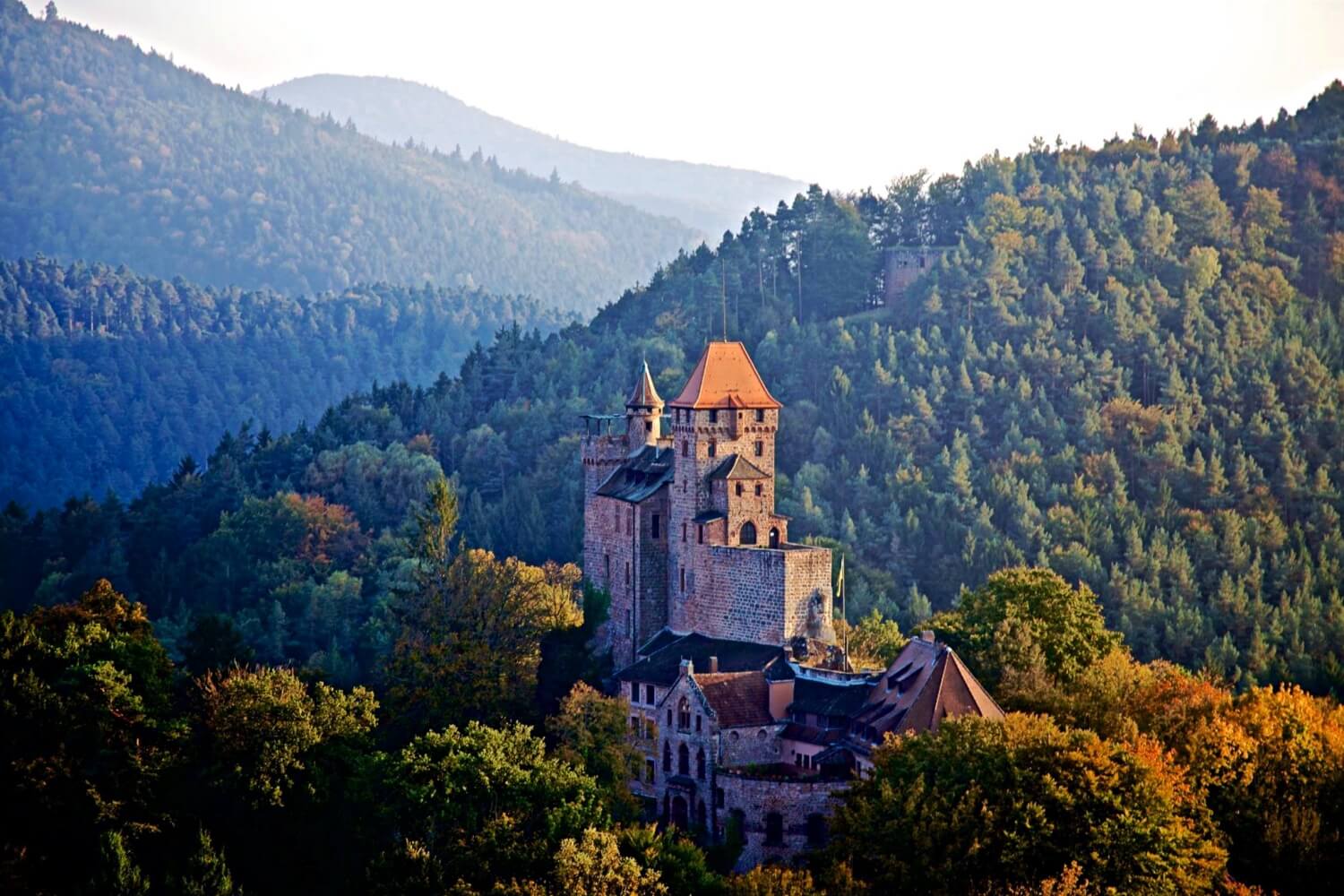Berwartstein Castle
Südwestpfalz Rheinland-Pfalz Germany
castle, chateau
Burg Berwartstein
Südwestpfalz Rheinland-Pfalz Germany
castle, chateau
Berwartstein Castle (German: Burg Berwartstein) is a castle in the Wasgau, the southern part of the Palatinate Forest in the state Rhineland-Palatinate in southwestern Germany
Der Berwartstein, stets mit Artikel, auch Bärbelstein oder (pfälzisch) Bärwelstein genannt, ist eine mittelalterliche Felsenburg im südlichen Pfälzerwald, dem deutschen Teil des Wasgaus (Rheinland-Pfalz)
Previous names
Berwartstein Castle, Burg Berwartstein
Description
Berwartstein Castle (German: Burg Berwartstein) is a castle in the Wasgau, the southern part of the Palatinate Forest in the state Rhineland-Palatinate in southwestern Germany. It was one of the rock castles that were part of defences of the Palatinate during the Middle Ages. This castle is noted in the publication Works of Preservation of Monuments of Rheinland-Pfalz, which was assembled and edited for the Ministry of Education and Culture. This states that the three prime examples of rock castles in the region are Drachenfels, Altdahn and Berwartstein, castles where the stairs, passages and rooms are carved out of the rock to form part of the accommodation essential to the defence of the castle. Although the Berwartstein appears more complete when compared to the ruins of neighbouring castles, it is only a restoration of the original rock castle. It is the only castle in the Palatinate that was rebuilt and re-inhabited after its demolition.
History
Origins
There is no definite record of the origins of the castle or its name. The name "Berwartstein Castle" is mentioned for the first time in a document dating from 1152, when the castle was granted by Emperor Frederick Barbarossa to Bishop Günther of Speyer.
Occupation by robber barons
During the 13th century, feudal tenants, who carried the name "von Berwartstein" inhabited the castle, which they used as a base for raids in the manner of robber barons. The imperial cities of Strasbourg and Hagenau joined forces against the von Berwartsteins. Following several weeks of futile attacks against the castle, they succeeded in taking it in 1314, with the help of a traitor. A large amount of booty and about 30 prisoners were taken to Strasbourg. The knights of Berwartstein were permitted to buy the prisoners back for a large ransom. The knights of Berwartstein were forced to sell their castle to the brothers Ort and Ulrich von Weingarten. Four years later the castle became the property of Weissenburg Abbey.
Under Weissenburg Abbey
The monastery at Weissenburg placed the castle in stewardship and established a feudal system. This allowed for the dismissal of vassals who became too presumptuous. Thus the monastery held possession of the castle for some time. This could have continued indefinitely had the last steward of the castle (Erhard Wyler) not gone too far. When he began feuding with the knights of Drachenfels, the Elector of the Palatinate took the opportunity to bring the Berwartstein Castle under his control.
Hans von Trotha
Because of his dynastic ambitions, the Elector of the Palatinate wanted to bring all of the Weissenburg estate under his control. To accomplish this, in 1480 he ordered the knight, Hans von Trotha, who was Marshal and Commander in Chief of the Palatinate forces, to acquire to Berwartstein. In this way he could enlarge the property at a cost to the Monastery of Weissenburg. For the quarrelsome knight this was a pleasure to fulfil, since this gave him a chance to take personal revenge on the Abbot of Weissenburg. Years before, Abbot Heinrich von Homburg had imposed a church fine on his brother, Bishop Thilo.
As a starting point for this conquering expedition, this experienced warrior first renovated the castle to improve its appearance. He built strong ramparts and bastions as well as the outwork and tower called Little France (castle).
Abandonment (1591 - 1893)
After von Trotha's death, Berwartstein Castle was inherited by his son Christoph and, when he died, it went to his son-in-law, Friedrich von Fleckenstein and remained in the hands of this family for three generations. During this time, the castle was destroyed by fire in 1591, and, since there is no mention of any attacks, it is presumed that the castle was hit by lightning.
Even though the main sections of the castle were not destroyed by the fire, it stood empty and unused for many years. In the Peace of Westphalia (1648), Berwartstein received special mention, when it was granted to Baron Gerhard von Waldenburg, known as Schenkern, a favorite of Emperor Ferdinand III. Since he did not restore the castle, it fell into ruins.
New life
A certain Captain Bagienski purchased the castle in 1893. In 1922, it was sold to Aksel Faber of Copenhagen, and thus went into foreign ownership. Since he was seldom in Germany, he asked Alfons Wadlé to be his steward. Later on, Wadlé was able to purchase the castle.
The village of Erlenbach below the castle was completely destroyed during World War II, and its inhabitants sought shelter in the castle. After the war, the roof had gone as well as the woodwork around windows, doors, staircases and other furnishings. Since the castle was not financially supported, Alfons Wadlé went about the renovation himself. At first he was only able to do what was essential to protect the castle from the elements.
Der Berwartstein, stets mit Artikel, auch Bärbelstein oder (pfälzisch) Bärwelstein genannt, ist eine mittelalterliche Felsenburg im südlichen Pfälzerwald, dem deutschen Teil des Wasgaus (Rheinland-Pfalz). Die Burg wurde – 300 Jahre nach ihrer Zerstörung durch Blitzschlag – in den 1890er Jahren wieder aufgebaut und ist als einzige im Wasgau noch bewohnt.
Zum Berwartstein gehörte früher das nahegelegene Vorwerk Klein-Frankreich.
Geschichte
Kaiser, Bischof und Berwartsteiner
Der Berwartstein wurde erstmals 1152 in einer Urkunde erwähnt, mit der Kaiser Friedrich Barbarossa ihn als Reichslehen übergibt an den damaligen Speyerer Bischof Günther von Henneberg. Deshalb wird angenommen, dass die Burg ursprünglich zu den Befestigungsanlagen der salischen und staufischen Herrscher gehörte, die in Südwestdeutschland ihre Stammlande hatten.
Im 13. Jahrhundert tritt ein nach der Burg benanntes Geschlecht auf, die Herren von Berwartstein, die als speyerische Ministerialen die Burg zu verwalten hatten. Weil den Berwartsteinern räuberische Handlungen vorgeworfen wurden, wurde die Burg 1314 durch Truppen der elsässischen Städte Straßburg und Hagenau belagert, eingenommen und zerstört. Nach dem recht bald erfolgten Wiederaufbau stand die Burg im Eigentum der Berwartsteiner, bis deren Geschlecht im Jahre 1345 ausstarb.
Kloster, Kurfürst und „Hans Trapp“
Über die Herren von Weingarten und die Eckbrechte von Dürkheim kam der Berwartstein 1347 an das dem Benediktinerorden gehörende Kloster Weißenburg. Mehr als hundert Jahre später, 1453, begab sich das Kloster unter den Schutz des Kurfürsten von der Pfalz, womit die Einräumung des sogenannten Öffnungsrechts verbunden war. Dies hätte dem Schutzherrn im Kriegsfall die unentgeltliche Nutzung des Klosters erlaubt.
Gegen den Protest des Klosters, das sich weiterhin als Eigentümer sah, übergab 1480 Kurfürst Philipp der Aufrichtige die Burg seinem Marschall Hans von Trotha, regional auch „Hans Trapp“ oder (seltener) „Hans Trott“ genannt, zu erblichem Lehen. Unter dessen Herrschaft wurde sie weiter befestigt und erwarb sich den Mythos der Uneinnehmbarkeit. 1484 ließ der neue Burgherr südlich gegenüber der Hauptburg und 370 m Luftlinie entfernt ein Vorwerk mit einem 14 m starken Turm errichten, das später im Volksmund „Klein-Frankreich“ genannt wurde.
Im folgenden Jahr übereignete der Kurfürst auch das „Zugehör“ der Burg an Hans von Trotha. Dieser ließ, weil das Kloster Weißenburg wiederum heftig protestierte, kurzerhand die nahe Wieslauter aufstauen und entzog so dem 8 km abwärts gelegenen Städtchen Weißenburg das Wasser. Nach den (erwarteten) Beschwerden von Abt Heinrich, der von 1475 bis 1496 amtierte, sorgte der Ritter für das Einreißen des Staudamms und verursachte in Weißenburg eine gewaltige Überschwemmung. Das Kloster bat daraufhin Papst Innozenz VIII., gegen Hans von Trotha den Kirchenbann zu verhängen, was der Nachfolger Alexander VI. 1499, 14 Jahre nach der sogenannten Wasserfehde, auch tat. Um nicht ebenfalls dem Bann zu verfallen, musste sich sein bisheriger Gönner, der Kurfürst, von seinem Gefolgsmann lossagen. Schon 1496 hatte sich der römisch-deutsche König und spätere Kaiser Maximilian I. gezwungen gesehen, gegen den Ritter die Reichsacht auszusprechen. Hans von Trotha kümmerte dies alles bis zu seinem Tode (1503) nicht, und zwei Jahre später wurden sämtliche Sanktionen postum aufgehoben.
Der Ritter ging unter seinem volkstümlich verballhornten Namen Hans Trapp ins Sagengut der Region ein. Die Ereignisse um die Wasserfehde sind im Rittersaal der Burg bildlich dargestellt.
Zerstörung und Teilrestaurierung
Als 1545 Hans von Trothas Sohn Christoph ohne männliche Nachkommen starb, erbte dessen Schwiegersohn Friedrich aus dem Geschlecht der Fleckensteiner die Burg. 1591 brannte sie nach einem Blitzschlag aus und wurde zur Ruine. In den folgenden Jahrhunderten wechselte der Berwartstein mehrfach den Eigentümer, bis er 1893 an Theodor von Baginski (1845–1929) kam. Dieser ließ ihn innerhalb von zwei Jahren wieder – überwiegend nicht originalgetreu – ausbauen und wohnte dort von 1899 bis zu seinem Tod. Die teilrestaurierte Burg steht in Privateigentum und dient bis heute als Wohnung.Der Rittersaal wird als Restaurant genutzt, ist aber frei zugänglich.
Das Vorwerk Klein-Frankreich wurde im 17. Jahrhundert, entweder im Dreißigjährigen Krieg oder im Pfälzischen Erbfolgekrieg, erheblich beschädigt. Mit der Restaurierung der Überreste wurde im Jahr 2005 begonnen.
Useful information
Gratis
6.00 EUR
- Schöne Aussicht
- WC
burgberwartstein@t-online.de
- Museumsshop
- Führungen nach Vereinbarung
- Hunde sind erlaubt
-
External links
Nearby castles
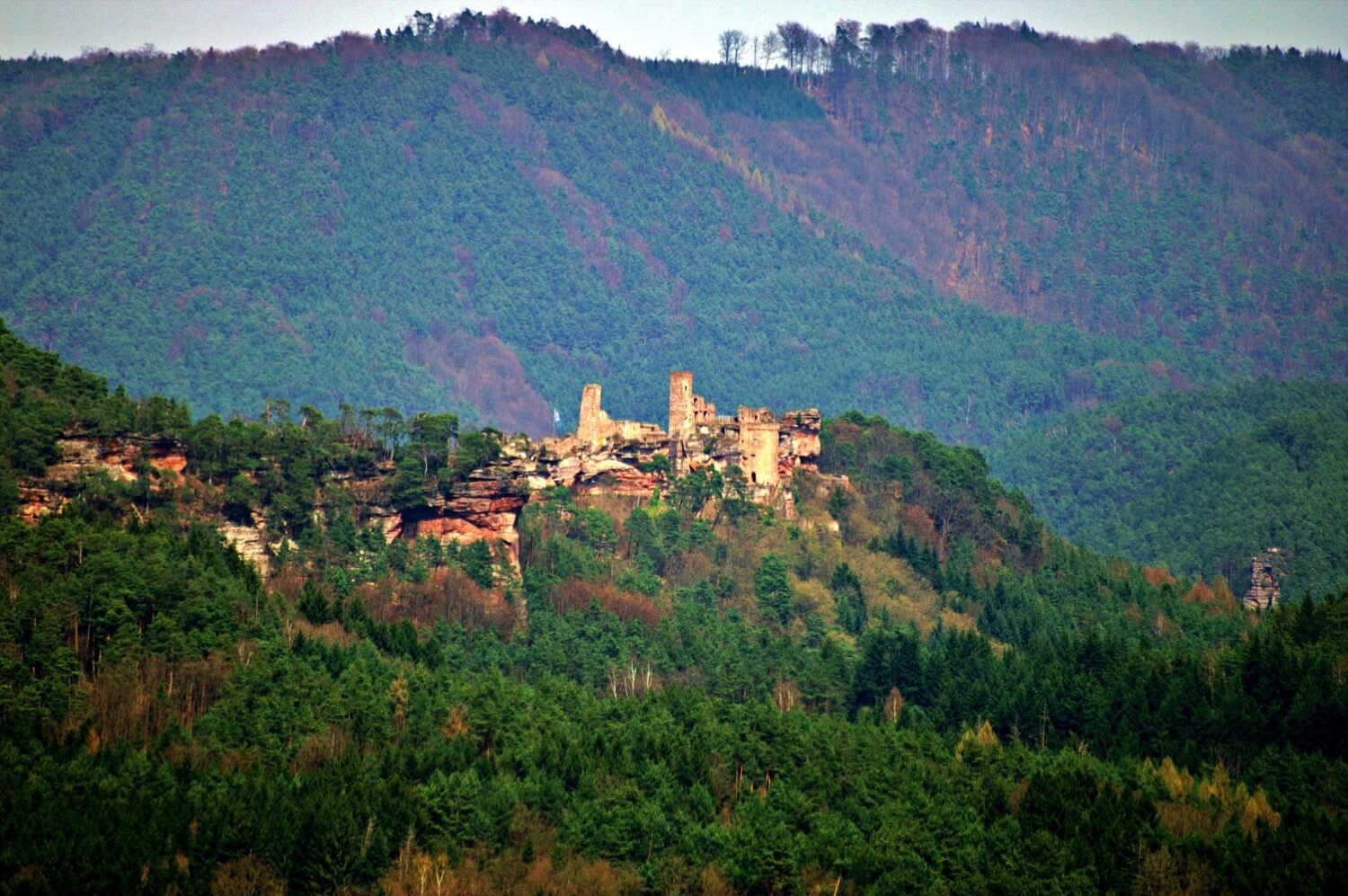
Altdahn Castle
Südwestpfalz
6.4km
castle, chateau
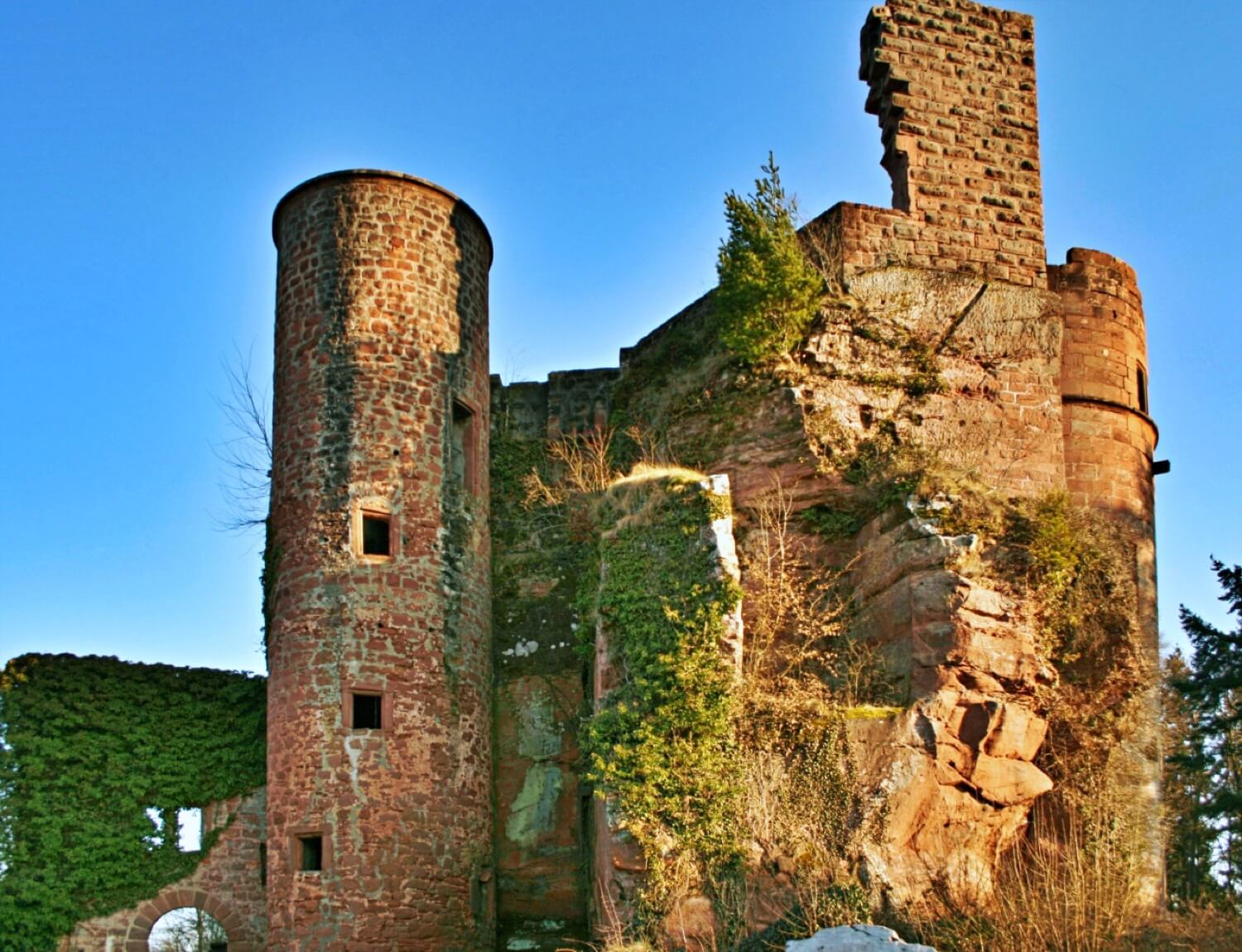
Neudahn Castle
Südwestpfalz
9.8km
castle, chateau
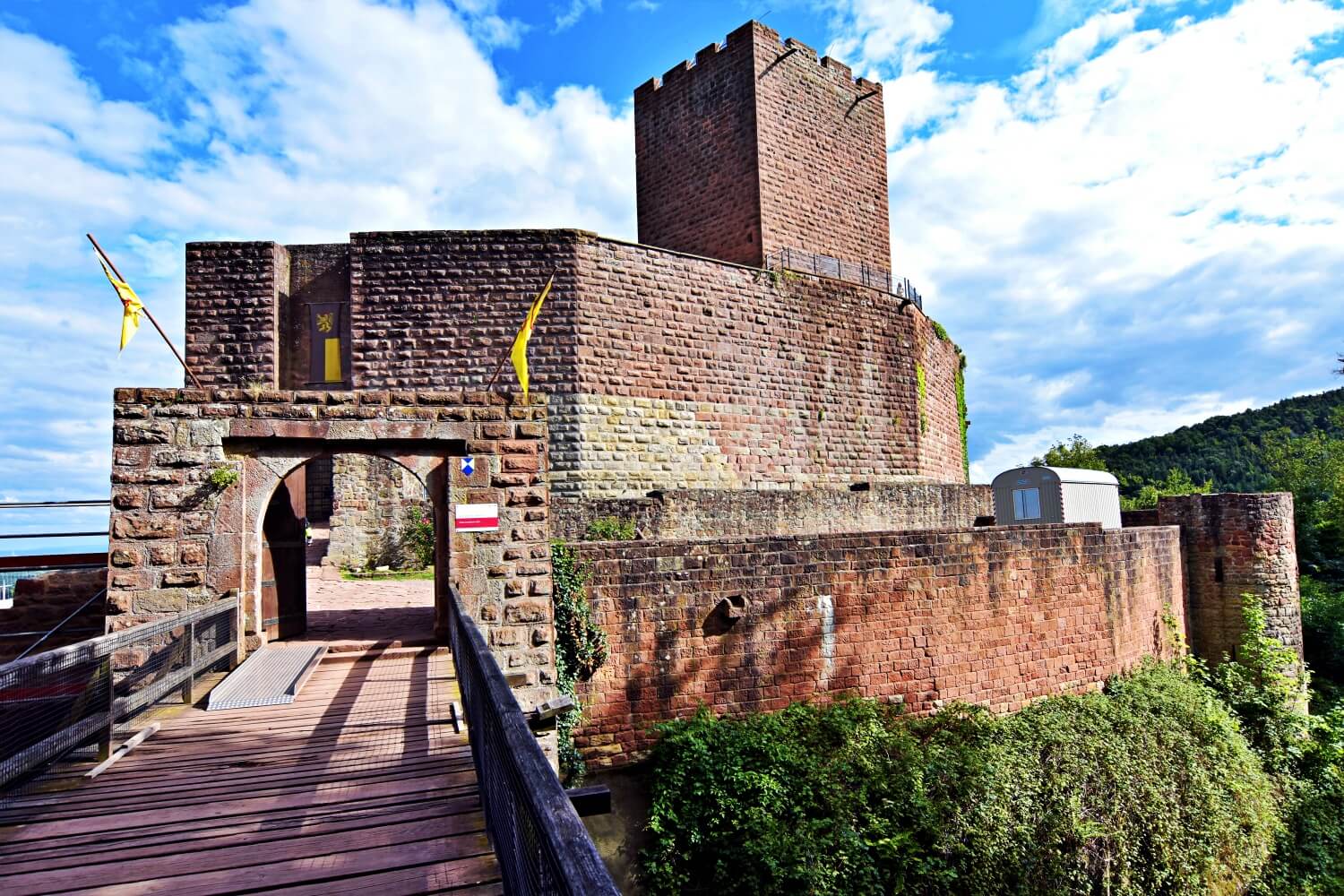
Burg Landeck
Südliche Weinstraße
11.1km
castle, chateau
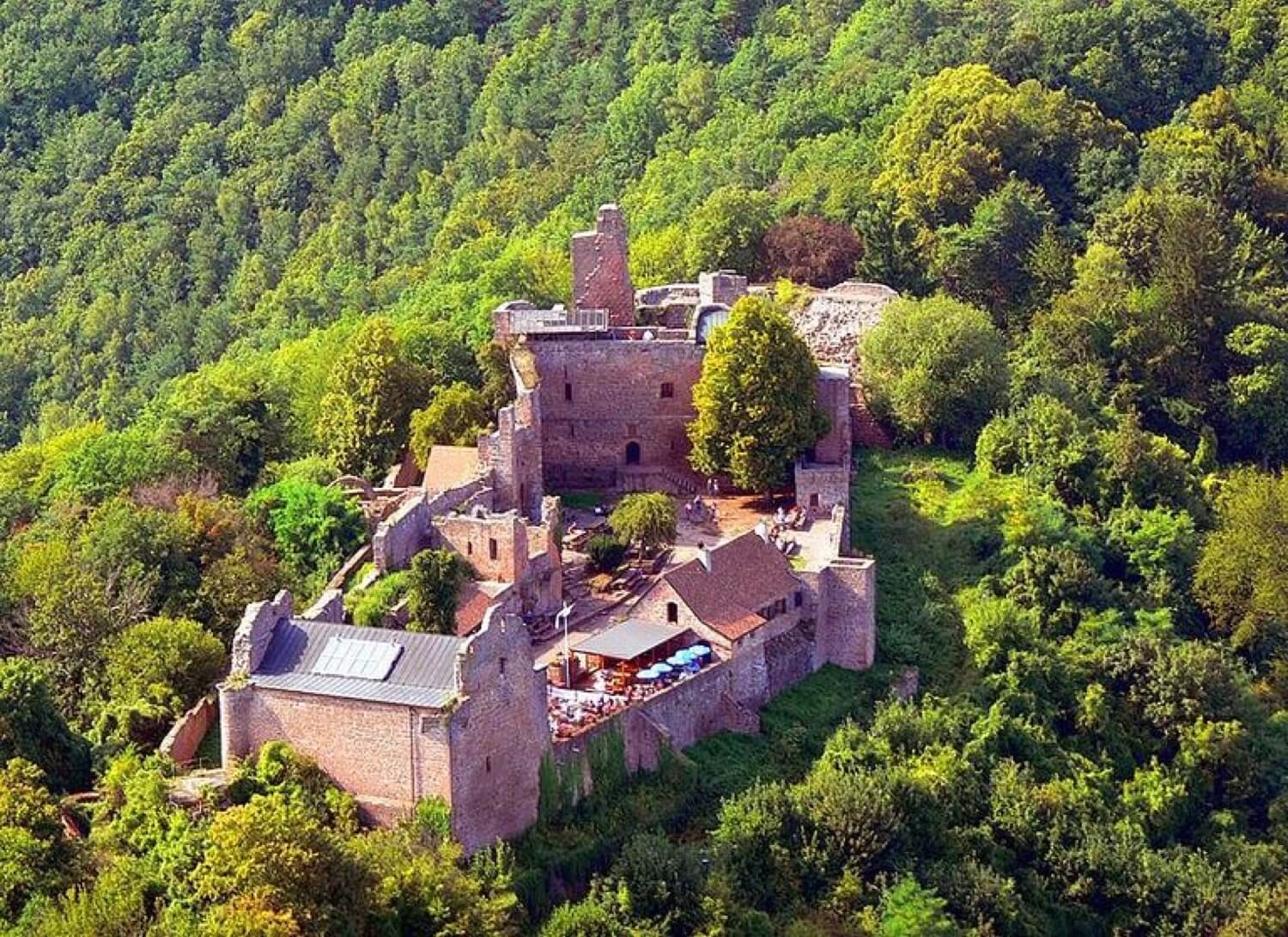
Madenburg Castle
Südliche Weinstraße
12.5km
castle, chateau
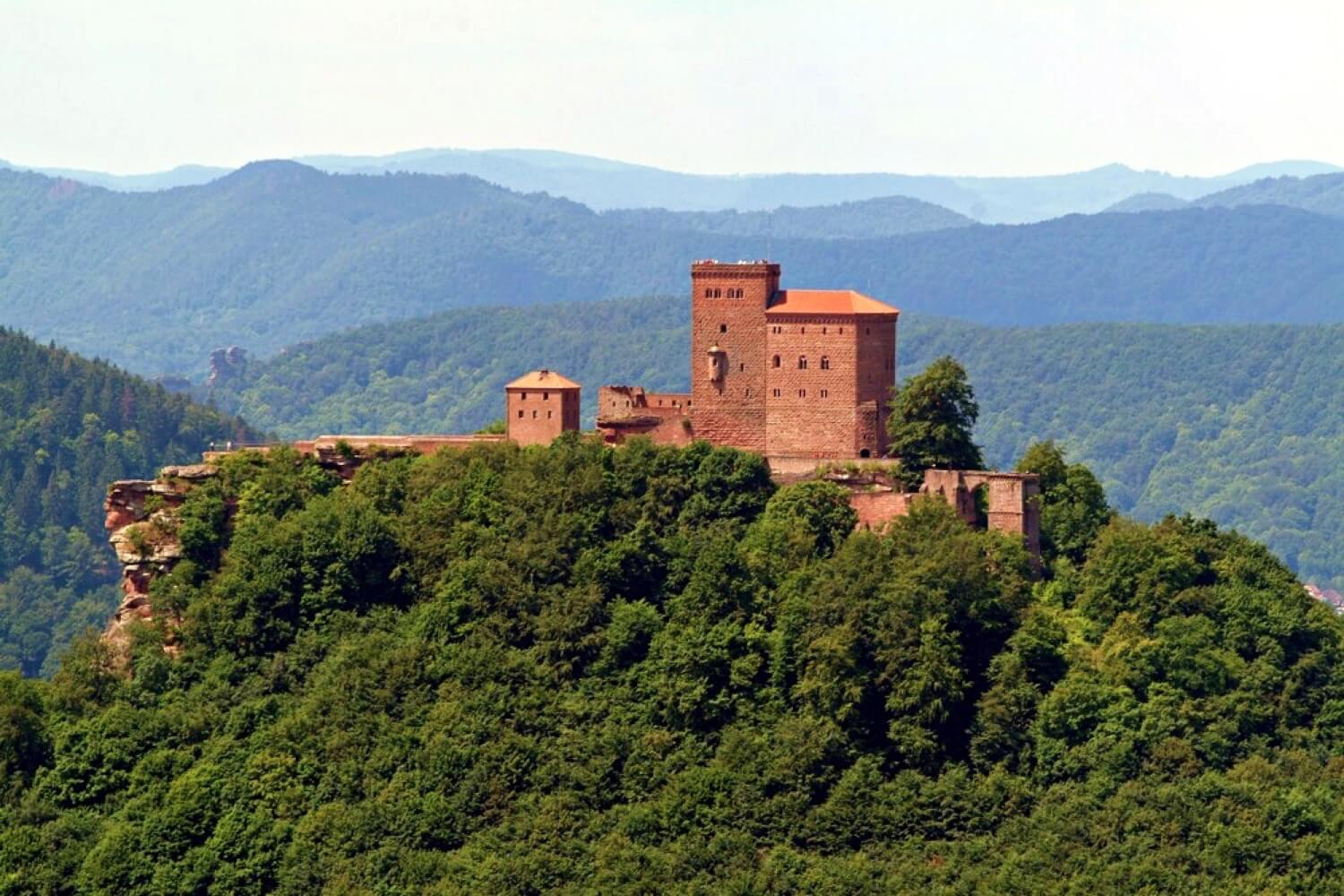
Trifels Castle
Südliche Weinstraße
12.9km
castle, chateau
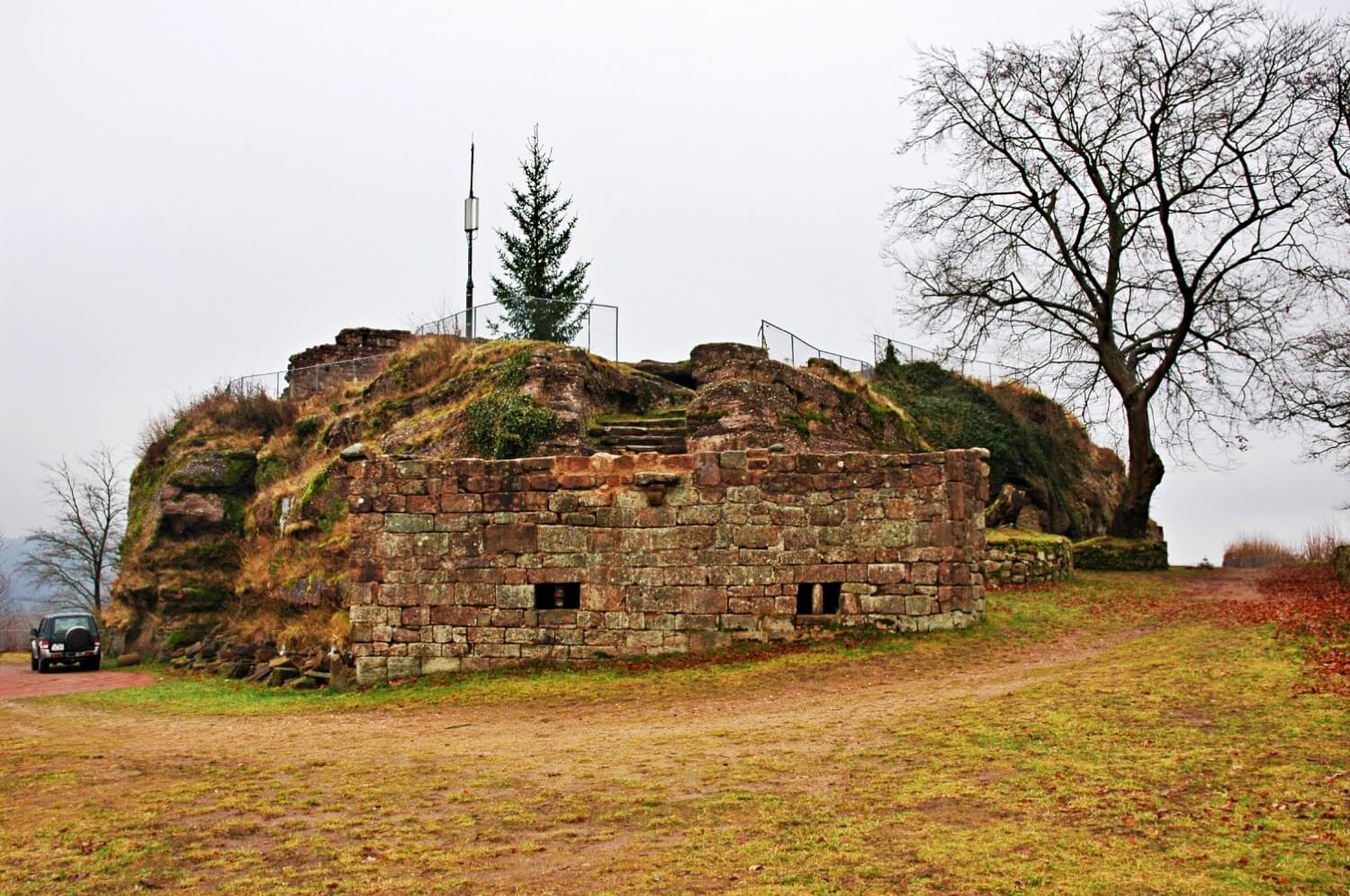
Lemberg Castle
Südwestpfalz
16.3km
castle, chateau

Burg Grafenstein
Südwestpfalz
16.7km
castle, chateau
